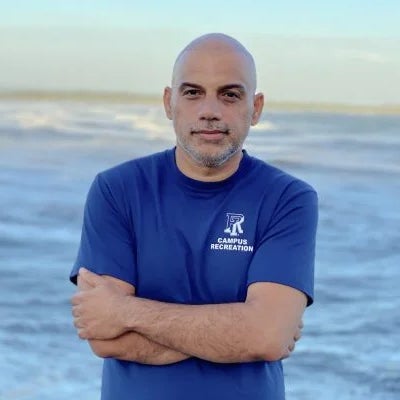- Professor
- Ocean Engineering
- Phone: 401.874.6217
- Email: reza_hashemi@uri.edu
- Office Location: Sheets Building, Rm 211
Narragansett Bay Campus - Google Scholar
- ResearchGate
- Accepting Students: Yes
Biography
Dr. Hashemi uses a combination of numerical models and observational techniques (i.e. ship-based or satellite-based data) to study ocean physics. He is interested in mathematical and numerical modeling of waves, and free surface flow from watersheds to coasts. He also works on sediment transport under the action of waves and currents. Another branch of his research concerns with numerical modeling of flow in the vicinity of structures. He applies new and powerful numerical techniques such as Differential Quadrature Method, Radial Basis Function Based Meshless methods (Multiquadric and RBF-DQ) and Smoothed Particle Hydrodynamics (SPH) to model the flow field. He also uses open source structured/unstructured ocean/wave models such as ROMS, TELEMAC, SWAN and ADCIRC in his research.
Dr. Hashemi is also the director of the Wave-Current Interaction Laboratory, located in the Ocean Technology Center at the Bay Campus. In this lab, tidal and wave energy devices can be tested in the energy flume. Further, we study the interactions of waves, currents, sediments, and structures in this relatively high-precision flume using a PIV system and other instruments.
Research
- Ocean Renewable Energy
- Coastal Resilience
- Hydraulics and Hydrology
- Numerical Applied Mathematical Modeling
Education
- Ph.D., Oceanography, Bangor University of Wales, 2014
- Ph.D., Civil/Hydraulic Engineering, Shiraz University, 2006
- M.S., Civil Engineering, Shiraz University, 1999
- B.S., Civil Engineering, Shiraz University, 1997
Selected Publications
| Qeshta IM, Hashemi MJ, Hashemi MR, Gravina RJ, Setunge S. Development of fragility functions for rigid-frame bridges subjected to tsunami-induced hydrodynamics forces. Structure and Infrastructure Engineering, 2022; 18(9), 1282-1299. doi: 19.1080/15732479.2021.1892774 |
| Kouhi S, Hashemi MR, Spaulding M, Hara T. Modeling the impact of sea level rise of maximum water elevation during storm surge events: a close look at coastal embayments. Climatic Change, 2022; 171(3), 1-20. doi: 10.1007/s10584-022-03342-x |
| Khojasteh D, Chen S, Felder S, et al. Sea level rise changes estuarine tidal stream energy. Energy, 2021. doi: 10.1016/j.energy.2021.122428 |
| Hashemi MR, Kresning B, Hashemi J, Ginis I. Assessment of hurricane generated loads on offshore wind farms; a closer look at most extreme historical hurricanes in New England. Renewable Energy, 2021; 175, 593-609. doi: 10.1016/j.renene.2021.05.042 |
| Qeshta IMI, Hashemi MJ, Hashemi MR, Gravina RJ, Setunge S. Development of fragility functions for rigid-frame bridges subjected to tsunami-induced hydrodynamic forces. Structure and Infrastructure Engineering, 2021; 1-18. doi: 10.1080/15732479.2021.1892774 |
| Kouhi S., Hashemi MR., Kian R., Spaulding M., Lewis M., Ginis I. Flood risk in past and future: A case study for the Pawtuxet River’s record-breaking March 2010 flood event. Journal of Flood Risk Management, 2020; 13(4), 12655. doi: 10.1111/jfr3.12655 |
| Kresning B, Hashemi MR, Gallucci C. Simulation of Hurricane Loading for Proposed Offshore Windfarms off the US Northeast Coast. Journal of Physics: Conference Series, 2020; 1452, 012026. doi: 10.1088/1742-6596/1452/1/012026 |
| Kresning B, Hashemi MR, Neill SP, Green JAM, Xue H. The Impacts of Tidal Energy Development and Sea-Level Rise in the Gulf of Maine. Energy, 2019; 187, 115942. doi: 10.1016/j.energy.2019.115942 |
| Farhadi H, Zahiri A, Hashemi MR, Esmaili K. Incorporating a Machine Learning Technique to Improve Open-Channel Flow Computations. Neural Computing and Applications. 2019; 31(3), 909-921. doi: 10.1007/s00521-017-3120-7 |
| Lewis MJ, Palmer T, Hashemi R, et al. Wave-Tide Interaction Modulates Nearshore Wave Height. Ocean Dynamics. 2019; 69(3), 367-384. doi: 10.1007/s10236-018-01245-z |
| Torres MJ, Hashemi MR, Hayward S, Spaulding M, Ginis I, Grilli St. Role of Hurricane Wind Models in Accurate Simulation of Storm Surge and Waves. Journal of Waterway, Port, Coastal and Ocean Engineering. 2018; 145(1). doi: 10.1061/(ASCE)WW.1943-5460.0000496 |
| Motaman F, Rakhshandehroo GR, Hashemi MR, Niazkar M. Application of RBF-DQ Method to Time-Dependent Analysis of Unsaturated Seepage. Transport in Porous Media. 2018; 125 (3), 543-564. doi: 10.1007/s11242-018-1138-7 |
| Neill SP, Hashemi MR. Fundamentals of Ocean Renewable Energy: Generating Electricity from the Sea. 2018; Academic Press, ISBN: 9780128104484 |
| Ward SL, Robins PE, Lewis MJ, Iglesias G, Hashemi MR, Neill SP. Tidal Stream Resource Characterization in Progressive Versus Standing Wave Systems. Applied Energy. 2018; 220, 274-285. doi: 10.1016/j.apenergy.2018.03.059 |
| Schambach L, Grilli AR, Grilli ST, Hashemi MR, King JW. Assessing the Impact of Extreme Storms on Barrier Beaches Along the Atlantic Coastline: Application to the Southern Rhode Island Coast. Coastal Engineering. 2018; 133, 26-42. doi: 10.1016/j.coastaleng.2017.12.004 |
Recent Grants
| 9/27/2921. Co-PI. Department of Energy. “Design, optimization, and control of floating offshore wind farms for optimal energy production.” |
| 10/30/2018. Co-PI. Restore America's Estuaries. “An Integrated Observational and Modeling Approach to Estimation of the Groundwater Contribution to the Water and Nutrient Budgets in Coastal Environments: Case Studies from Narragansett Bay and Southern RI Coastal Lagoons.” |
| 7/12/2018. Co-PI. RI Coastal Resources Mgt. Council. “CI – HUD V BEACH SAMP.” |
| 10/10/2017. PI. RI Coastal Resources Management Council. “A Hydrodynamic Model Study to Assess the Impact of Dredging the Channels Connecting Ninigret and Green Hill Point on Circulation and Flushing of Green Hill Point, Charlestown, RI.” |
| 10/3/2017. Co-PI. RI Coastal Resources Management Council. “CI - HUD V BEACH SAMP.” |

